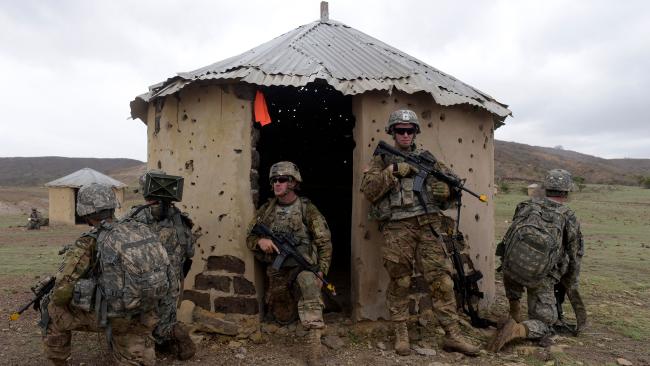Africa’s prosperity depends on security, and Australia has role
The killing of four US soldiers in Niger by 50 Islamic State-affiliated militants , and the controversy over President Donald Trump’s compassion for the soldiers’ families, has drawn attention to terrorism in Africa this month.
The US has about 1000 troops distributed over the Lake Chad Basin — Nigeria, Niger, Cameroon and Chad — and most of them are in Niger. For the past two years Niger has been at war with Boko Haram. The US is building a significant drone base in Niger to monitor the movements of Islamist insurgents in the Sahel region.
Niger is important in the war on terror: along with Chad and Mali it’s a bridge between north and sub-Saharan Africa. The three states serve as transit routes for local al-Qa’ida and Islamic State affiliates.
This month Malcolm Turnbull announced, at his Sydney meeting with President Mahamadou Issoufou of Niger, that Australia will assist Niger to strengthen its counter-terrorism capabilities by training in military skills and the law of armed conflict.
It’s a good start, but we should be doing more to assist Africa in counter-terrorism. Australia has 190 ASX-listed companies running 590 mining and exploration projects across 38 countries on the continent.
Many Australian mining operations are in states in West Africa and the Sahel region, as well as Kenya and Tanzania, where such projects are potential targets for violent extremist groups. At the same time, through corporate social responsibility programs, our mining companies can mitigate some of the drivers of violent extremism. A more secure Africa is one in which Australian economic engagement can flourish.
We should send a defence officer to serve with the US Africa Command, which oversees American military operations in Africa. An Australian officer serving with this force, known as AFRICOM, would build on the contact our military have had already: our Special Forces have twice participated in Operation Flintlock, an annual exercise among African, allied and US counter-terrorism forces in nations across the Sahel region.
The evolving Australia-France strategic relationship could provide useful partnering opportunities for counter-terrorism co-operation in Africa. We should be lifting our modest efforts to develop training for African peacekeepers and co-operate with the African Union on security.
Countering improvised explosive devices is of great concern in Africa. Our military rates with the best in the world at managing this threat, so we should offer support and training here.
There’s minimal funding for Australian defence co-operation with Africa: we have only one defence attache on the continent, based in Addis Ababa. That’s totally inadequate to cover the many areas of potential defence co-operation across 54 countries.
We should strengthen our defence presence by also appointing a military attache to operate in the Sahel. Our mission in Nigeria, headquartered in Abuja, is an obvious location from which to advance our understanding of security requirements in West Africa.
We should continue to allocate places to African students in our military staff colleges to promote greater military co-operation between the two continents. Wider training opportunities in counter-terrorism in Africa should be explored by Australia’s ambassador for counter-terrorism.
Australia recently hosted a visit here by the Kenya’s ambassador for counter-terrorism. We should identify other African countries to share relevant counter-terrorism lessons. Our recently opened embassy in Rabat, Morocco, could assist in tracking terrorism threats more closely across the Maghreb.
We should be spending more of our limited African aid budget in those countries threatened by jihadist groups and lacking the resources to fund the necessary capabilities to defeat those terrorist groups. Last year the OECD recognised that activities to prevent violent extremism can be officially counted as development assistance.
Australia has designed and delivered social-media and open-source intelligence training to our Kenyan counterparts. We should expand that training to other African countries.
Africa’s full of mosques built with Saudi and Libyan money, and imams trained accordingly. That needs to be balanced with more enlightened Islamic preachers. We should sponsor educational institutions that compete with radical messages emitted from foreign-funded educational institutions.
We might partner in areas such as security sector reform and forensics. But our federal police have only one Africa-based officer, in Pretoria. An additional AFP presence in Nairobi would give us a better understanding of the terrorist threat from the Horn region. Nairobi is the headquarters of the Eastern African Police Chiefs Co-operation Organisation.
The outlook for economic growth in sub-Saharan Africa is positive, second only to Asia, but security is critical for African prosperity. Australia should make a greater contribution to building Africa’s resilience to the forces of international terrorism.
Source: The Australian





